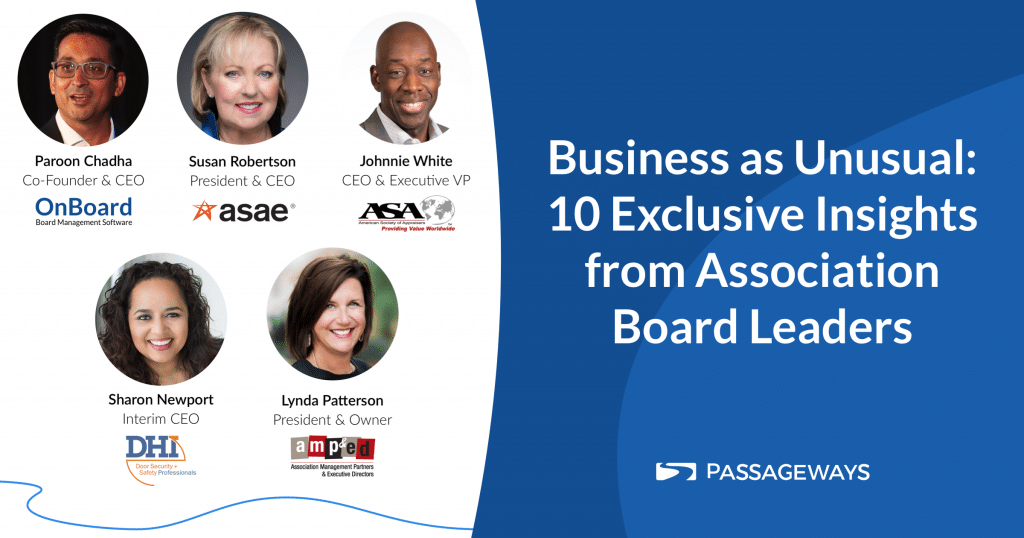
These were just a few words Association Board Leaders used to describe the current business environment, which we call “Business As Unusual.”
“Hopeful.”
“Smarter.”
“Invigorated.”
“Optimistic.”
And they should know! Since the very beginning, Associations have been on the frontlines of the COVID-19 pandemic. From strategic planning to community engagement, the pandemic has required Associations and leaders to rethink the status quo and adapt to ensure their members can continue to grow and thrive.
ASAE: The American Society of Association Executives and OnBoard recently brought a panel of innovative leaders together to share their insights on how board and leaders are navigating this new era. They include:
- Paroon Chadha, Co-Founder and CEO, Passageways
- Susan Robertson, CAE, President & CEO, ASAE: The Center for Association Leadership
- Sharon Newport, CAE, Interim Chief Executive Officer for DHI – Door Security + Safety Professionals and Executive Director for the Door Security & Safety Foundation
- Lynda J. Patterson, FASAE, CAE, President & Owner, AMPED Association Management
- Johnnie White, MBA, CAE, CMP, CEO/Executive Vice President, American Society of Appraisers
Key takeaways from this panel of experts include:
- The Landscape Has Changed for the Association Industry
- The Role of the Board Continues to be Strategic
- Scenario Planning Helps Open New Opportunities
- 2021: Predicting the Unpredictable
The Landscape Has Changed for the Association Industry
In many ways, the pandemic has proven to be a game-changer for the Association industry. Each of our panelists drew on their extensive experience to compare and contrast the way things used to be versus the way they are now. Caution and slowness have given way to urgency and relevancy.
- “We all know that Associations get accused sometimes of being a little slow to react and male decisions. What I’ve seen in this current environment is just the opposite: Associations have been quick to react. I have seen Associations really turn on a dime and kind of disrupt that notion that we are not as nimble as we might be. We are nimble, and I think that’s going to be something that stays with us. That gives me a great deal of hope.” – Susan Robertson
- “For many of us, our number one member benefit and value is our annual conference or meeting. Obviously, that has shifted for probably all of us. From a broad association industry perspective, this pandemic has really become about driving greater value. I see that across all of our association clients, regardless of whether their industry is doing well or if it’s completely shut down. Associations are there to provide timely information, polling, and benchmarking about what others are going through in a region, country, or part of the world that is in their business.” – Lynda Patterson
- “Prior to the pandemic, a conversation with another Association colleague would often toss around the metaphor of Associations being like big, beautiful yachts. We had a lot of people aboard, we did things very well, and it was a good time. But we weren’t necessarily very nimble, at least in reputation.
Urgency can be the mother of invention and certainly the premise for forgiveness in these moments. I think that a lot of that is being allowed now from our members in our industries. I also think that the Association professions did a fantastic job at sharing knowledge with one another. But often our members were so busy that it was sometimes hard to pick up the phone and get some data from them. I find now that they’re very interested in making sure we know what’s going on with them so that we can meet their needs in a really different kind of way. That’s encouraging.” – Sharon Newport
- “There are three things I’m seeing different in the Association industry.
- I think the adoption of technology is changing the landscape. Some Associations have been around for hundreds of years, and they were just a little afraid to adopt some of the technology. Now that we were forced into having to do something different, we had to bring in technology such as our annual conferences now being virtual. If you talked to a board member a year ago, they would have never thought about doing anything from a hybrid or a virtual standpoint.
- Thinking short-term rather than long-term. When looking at our financial statements, cash is king for us. Not that we’re not looking at long-term, but we have a more focused view on our short term, especially when it comes to cash. We want to ensure that we have enough cash to cover our expenses.
- Collaboration. Since the beginning of this pandemic, there has been a lot of collaborations among Associations who at one point were competitors. I think we have all seen saw that it was better for the profession if we worked together. My organization – with a lot of other organizations – has started to come together from advocacy and education standpoints. I think that’s going to continue to be the way that we’re going to be working in this new landscape.” – Johnnie White
The Role of the Board Continues to be Strategic
While the role of the Association board was already evolving to focus on long-term strategy prior to COVID-19, the crisis has accelerated that evolution. Several panelists emphasized the importance of and value they place on the board as a strategic asset.
- “We went into this with the luxury of having a board that was very strategic. But we pulled them in on more of our decision-making, especially with the decision to take a citywide meeting completely virtual. From a CEO perspective, I really appreciated that because this was a huge decision and a big risk for us. It’s been interesting for me to see the tactical support.
They have also continued to be a good benchmark for us based on what’s happening in their institutions. They’re mostly academic, so we’re regularly asking them about what their travel restrictions look like and how far is that going out down to much more strategic things for the Association long-term.
Another thing that was a little bit of a surprise is that while this group was highly professional, business-focused, and strategic, I started to see a softer, more personal side. They’ve always been great to work with, and now I’m also seeing them check in with one another and take time for that.” – Lynda Patterson
- “[At ASAE,] we have a unique situation in that all of our board members run their own associations or some part of the industry that supports Associations. They have a unique vantage point. The good thing for us is that they bring their own stories and their own expectations to the table. That really does help ASAE be more responsive to the general needs of the Association community. So I look to our board to be a true reflection of what is needed in our community. That’s a really important role. It’s not to say that the board hasn’t always played that role, but it was less urgent. When an organization is as mature as ASAE is, it was very easy to just say, ‘Everything’s fine.’ I think the board has stepped up.
As to how the board’s role will transform post-COVID, I think we’ve been well on our way to that for a while. And I get the sense from other Association executives that their boards are doing the same. We’ve all adapted to a new way of working together and a new way of communicating. Certainly, I think we miss the closeness that a board feels when they can meet and exchange ideas in person, but we’re all doing fine.
Overall, I would say the board is much more engaged, much more tolerant of risk, and will develop more tolerance for imperfection. Knowing that we’re going to try some new things, that we’re going to fail fast. And that we’re going to rebound quickly is much more a part of our vocabulary than it once was.” – Susan Robertson
Scenario Planning Helps Open New Opportunities
Associations have strategic planning cycles that play a vital role in setting their agenda, goals, and mission. Never has this been more true than during the pandemic. Several panelists talked about how they’ve used their long-term scenario planning to open up new member opportunities.
- “Scenarios are really important, and I think the primary one that everybody is looking at is about revenue. What if revenue drops to this or to that? What triggers would we have financially, should we have a loss of revenue that would be greater than we predicted. At the same time, we’re looking at that and the financial success of hybrid meetings because there’s a completely different cost structure. Those are the scenarios we’re looking at.
In the positive sense, though, the scenario that we know we must do better at and do more of is how we create an experience for our members online. However we touch them – with online learning, virtual webinars, just-in-time programming and how they interface with us on our various web properties – is a primary focus right now because that’s where the game is. That’s how people are going to connect with us and have meaningful experiences.
We’re looking at what will drive recovery as well as revenue as we work through these various scenarios.” – Susan Robertson
- “From a financial perspective, we have run some really profitable virtual meetings. We have that luxury in terms of how we can use what we’ve learned to really build upon this. We have found by offering high quality virtual meetings, we’re removing barriers of time, travel, and cost to present at an international conference, to have the opportunity to be peer reviewed, and to be mentored. So it really has opened up for us some of the goals that we’ve had as an organization to be much more inclusive, to offer even more opportunities to have young investigators or people who may be interested in going into neurology or MS. That has been really exciting.
In short, I think just looking at the opportunities that this has provided and build upon those, I think we’ll be able to build business and financial models to support that as well.” – Lynda Patterson
2021: Predicting the Unpredictable
There is a saying: “It is often said there are two types of forecasts: lucky or wrong.” Nevertheless, two of the panelists offered one prediction they see coming true by the end of 2021.
- “I think 2021 will continue to challenge us and help us continue to grow in ways that we never expected. To grow as leaders and as staff. For boards to continue to grow in their maturity, and in terms of governing the organization. I also see virtual meetings actually making money. I think that I would say don’t be afraid to make money on your virtual meeting.” – Lynda Patterson
- “I think we’re going to see a lot of hybrid models, especially towards the third and fourth quarter. Initially. we’re not going to be able to have very large meetings. So I think we’ll see a lot of lessons learned by the end of 2021. And then as we go into 2022, we’ll start to see some normal state of in-person travel back and things of that nature.” – Johnnie White
Watch the Webinar Replay to Learn Even More
There was plenty more to be learned from this rich and thoughtful conversation, so we encourage you to sign up and watch the full webinar replay.
About The Author

- At OnBoard, we believe board meetings should be informed, effective, and uncomplicated. That’s why we give boards and leadership teams an elegant solution that simplifies governance. With customers in higher education, nonprofit, health care systems, government, and corporate enterprise business, OnBoard is the leading board management provider.
Latest entries
 Board Management SoftwareJuly 26, 20225 Critical Board Engagement Survey Questions
Board Management SoftwareJuly 26, 20225 Critical Board Engagement Survey Questions Board Management SoftwareJuly 19, 2022What is an Advisory Council? (Overview, Roles, and Responsibilities)
Board Management SoftwareJuly 19, 2022What is an Advisory Council? (Overview, Roles, and Responsibilities) Board Management SoftwareJuly 15, 2022Balance Sheet vs. Income Statement: What’s the Difference?
Board Management SoftwareJuly 15, 2022Balance Sheet vs. Income Statement: What’s the Difference? Board Management SoftwareJuly 12, 2022Sweat Equity: Mark Haas of the Dallas Cup Board Gives a Nonprofit Play-by-Play for Success
Board Management SoftwareJuly 12, 2022Sweat Equity: Mark Haas of the Dallas Cup Board Gives a Nonprofit Play-by-Play for Success
